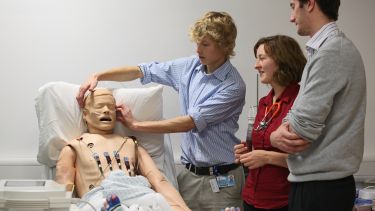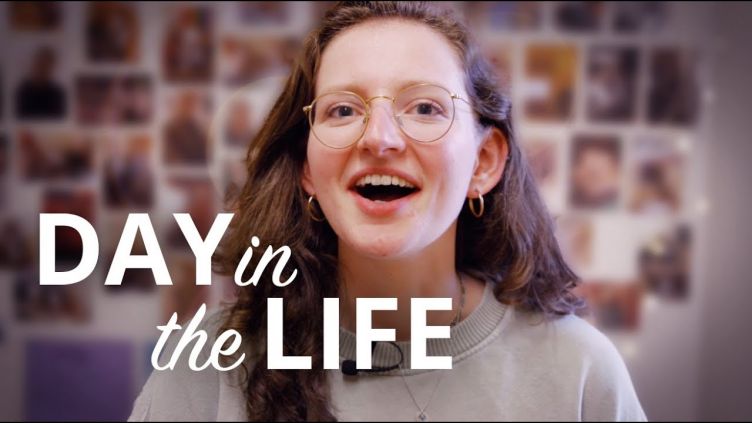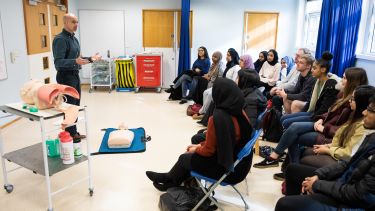Medicine MBChB
2024-25 entryWith a strong focus on patient-centred learning, our Medicine MBChB course is designed to educate and train you to become an excellent doctor. Over the five-year programme, you can gain the clinical abilities, knowledge, attitudes and professional behaviours you will need to thrive in medicine.
Key details
- A Levels AAA
Other entry requirements - UCAS code A100
- 5 years / Full-time
- September start
- Find out the course fee
- Industry placement
- View 2025-26 entry
Explore this course:
This course is no longer taking applications for 2024-25 entry. View 2025-26 entry or find another undergraduate course.
Course description

Our Medicine MBChB course is designed to educate and train you to become an excellent doctor. Over the five-year programme, you can gain the clinical abilities, knowledge, attitudes and professional behaviours you will need to thrive in medicine.
Diverse clinical placements
You’ll gain hands-on experience from the start, with clinical teaching in GP practices, hospital wards and clinics, alongside lectures, seminars, tutorials and practical classes. In addition, you’ll use our Clinical Skills Centre at Northern General Hospital – one of the largest in the country – to practise your learning in simulated wards, resuscitation suites and theatres.
Learn from patients
Being a great clinician doesn’t just mean knowing the hard facts or the latest techniques - you need to be able to speak, listen and empathise with patients. That’s why you’ll be taught the social aspects of medicine and spend time learning from real patients with real illnesses. Studying this way means you’ll be able to reflect on your clinical knowledge in the context of real people with their own unique perspectives and respond to problems in a range of primary, secondary and tertiary care settings.
Research-informed practice
Studying Medicine in Sheffield means joining a community where curiosity and innovation are celebrated. Our team is known for conducting world-leading research with tangible, life-changing applications – from developing new techniques for diagnosing heart failure to trialling new cancer treatments. Studying with us means you’ll always be able to draw on the latest research and make informed, evidence-based choices in your own medical practice.
Prepared for the future
Once you complete your degree, you’ll leave Sheffield with a passion for medicine and the confidence and competence you need to succeed as a junior doctor. You will graduate with an MBChB, which is classed as a primary medical qualification (PMQ) by the General Medical Council (GMC). Assuming you meet their Fitness to Practise guidelines, you can then provisionally register with the GMC and apply for a Foundation Year 1 post.

Modules
A selection of modules are available each year - some examples are below. There may be changes before you start your course. From May of the year of entry, formal programme regulations will be available in our Programme Regulations Finder.
Choose a year to see modules for a level of study:
UCAS code: A100
Years: 2022, 2023, 2024
September Year 1 to June Year 1
Introductory Clinical Competency
- Introduction to Medical Studies and Medical Sciences
- Introductory clinical competencies
- Systems-based learning and teaching (Cardiovascular, Respiratory, Gastrointestinal and Liver, Musculoskeletal, Skin, Nervous, Genitourinary, Endocrine, Reproductive, Haematology, Immunology)
- Integrated Clinical Demonstrations
- Multi-Professional Experience (a 2-week teaching block focusing on clinical skills development)
- Early Years General Practice Placement (10 half-days through year 1)
- Community Attachment Scheme
- Public Health and Population Health Science
- Medical Ethics
- Personal and Professional Development
- Student Selected Components (SSCs)
The structure of Phase 1 follows the General Medical Council's (GMC) Guidelines and is largely 'systems-based'. Information is presented in a series of modules which cover the basic systems of the body and also involve Public Health and Population Health Science, Medical Ethics, Professionalism and Patient Safety and Student Selected Components.
Much of the teaching takes place in the Medical School which is sited next to the Royal Hallamshire Hospital. A significant part of Phase 1 involves working outside the main campus, for example at the clinical skills units at the Northern General Hospital and the Royal Hallamshire Hospital, on the wards of nearby hospitals or within a community setting including general practice and some social service locations.
Phase 1 includes a two-week Multi Professional Experience (MPE), which introduces you to working with doctors, nurses and other healthcare professionals. Students also have ten regular placements in a General Practice throughout the first year, starting in week 2 of the first term.
Phase 1 focuses on the normal structure and function of the human body. Whilst it is obviously important to cover subject disciplines such as Anatomy (including embryology and histology), Physiology and Biochemistry, these are presented in an integrated way within the relevant body system under study.
For example, in the cardiovascular system module, the structure, function and metabolism of the heart will be studied. In addition, aspects of Public Health, Ethics and other relevant topics are integrated into the course with a Public Health/Population Health Sciences module that runs longitudinally throughout the year.
Learning is by practical classes, lectures, flipped classrooms, tutorials and self-directed study. Computer-based learning is used routinely within Phase 1 and student evaluations of these packages show that they are very well received.
Students complete summative pieces of coursework during Phase 1, which develops generic graduate skills. These student-selected components focus on the history of medicine, critical analysis and communication of health information. The first of these is launched in the first week.
Formal assessment in Phase 1 consists of a written examination paper (multiple-choice and clinically related 'scenario-based short answer' questions) and a practical examination. The whole examination must be passed before progression to the next stage. However, if a student fails there is an opportunity to resit the examination during the summer vacation period.
September Year 2 to December Year 3
Basic clinical competencies
- Research Project
- Early Years General Practice Placement
- Clinical Attachments
- SSCs
- Clinical Medical Sciences
- Clinical Skills
Phase 2a of the course lasts for one academic year and starts with a six-week research project. Students are attached to researchers within the Faculty of Medicine, Dentistry and Health and have an opportunity to develop their research skills.
Medical Sciences feature strongly in Phase 2a. Your knowledge and understanding will be developed through both lectures and clinical experience in ten half-day general practice placements. You will build on the knowledge that you gained in Phase 1 by learning about the clinical presentation of disease (symptoms and signs), pathology, microbiology, immunology, the investigations that are used in diagnosis and the way that specific diseases are treated (pharmacology and therapeutics).
Medical sciences are assessed in written examinations (multiple choice and clinically-related scenario short answer questions) at the end of Phase 2a.
In Phase 2a, you will also receive training in a large number of procedural clinical skills in simulation (e.g. obtaining a 'blood' sample from a manikin arm). Your ability to perform these procedures safely will be assessed in simulation during Phase 2a, so that you are ready to perform them under supervision in clinical practice for the remainder of the course.
Phase 2b commences in June of the second academic year and is the stage of the course where students really begin to feel like trainee doctors. You will spend most of your time in hospital wards, operating theatres and outpatient clinics, learning the skills that you will need to join the medical profession.
At the start of Phase 2b, you will receive a three-week introduction to basic clinical skills. You will receive training from specialists in history taking and physical examination of all of the major body systems. This teaching is delivered to students in small groups, at the bedside, with the assistance of real patients who volunteer to assist with your training. This introductory course will equip you with the basic skills that you need before you start your clinical attachments.
You will then undertake a 12* week longitudinal integrated clinical placement (LICP1) in one of the hospitals in or around Sheffield. (*14 weeks duration with a 2 week holiday at the start of August). LICP1 is designed to provide you with the opportunity to develop the skills that are fundamental to clinical practice (history and physical examination. You will be encouraged to use the information that you have already gained to formulate diagnoses. You will become part of the clinical team and will attend and participate in many of the everyday activities of the team, such as ward rounds, surgical operation, pathology meetings, and outpatient clinics.
In addition you will gain broader experience in other departments in the hospital and develop your knowledge and understanding of clinical medicine in regular classes in the medical education departments in the hospitals.
During this time, you will also continue to develop the professional attributes that are essential to becoming a successful practicing doctor. You will also complete an SSC in medical ethics and law, based on a real case that you have seen in clinical practice and the ethical issues this case raised (e.g. end of life care).
Phase 2b will give you a firm foundation for all future clinical Phases of the course. By the end of Phase 2b, you will have gained a knowledge and understanding of disease and a set of clinical skills (history-taking, physical examination, procedural skills in clinical practice) that you will continue to use throughout your career.
The assessment at the end of Phase 2b is an objective structured clinical examination (OSCE) in which you will demonstrate your clinical learning by taking histories and performing physical examinations on simulated and real patients.
Students who pass the Phase 2b OSCE at the first sitting will complete an SSC in social accountability in which they will complete some voluntary work with patient or community groups in Sheffield or the surrounding area and through this, will increase their understanding on health inequity and the role of medicine in society.
January Year 3 to August Year 4
Extended clinical competencies
- Clinical Team Attachments
- Child Health
- Women's Health
- Mental Health
- SSCs (including Community-based and an Elective)
- Medical Sciences
- Acute Clinical Care
- Continuing Clinical Care
- Community and Public Health
- Specialty Clinical Attachments
- Further SSCs including Medical Audit
Phase 3 lasts just under two years and is clinically based. It is a period of study and clinical experience taking students into both primary and secondary care of the patient with an emphasis on 'hands-on' medicine.
The primary care element involves community placements centred on General Practice.
The secondary care of patients covers mainly hospital work in sub-speciality subjects including child health (Paediatrics), women's health (Obstetrics and Gynaecology), mental health (Psychiatry) and General Practice. Students rotate in small groups through these disciplines and receive various forms of back up including small group work, seminars, tutorials and lectures.
The emphasis is on evidence-based learning and you are encouraged to learn by investigation and teamwork. The speciality teaching includes projects and team presentations. You also have an opportunity to study areas of particular interest to you in the Student Selected Components elements of the course.
Year 5
Final preparation for clinical practice
- Final preparation for becoming a Junior Doctor
- LICP2 and LICP3
- Student assistantship
The final year of the course will provide you with the opportunity to prepare for clinical practice after graduation. The year begins with a series of lectures that will allow you to consolidate and further develop your knowledge over a wide area of clinical medicine.
You will then undertake the two longitudinal integrated placements (LICP2 and LICP3) which will be in a different hospital and clinical area from LICP1. The structure of LICP2 will be similar to LICP1 (attached to a clinical team, defined role and responsibilities, additional experiences in other departments and regular classes) but will reflect your increased experience and competence. After the Christmas break, you will continue to develop your competence in LICP3 in another hospital and clinical area.
Most graduates continue their medical training in postgraduate foundation programmes. The student assistantship will provide you with six weeks of experience in the post you will take up in August (this can only be guaranteed for students who will be staying in the local area).
The confidence of the University in you will be demonstrated when it awards you the degree of MBChB after you have been successful in the clinical examination in May. Phase 4 is an exhilarating, exacting and rewarding time and will prepare you well for your duties as a junior hospital doctor.
The content of our courses is reviewed annually to make sure it's up-to-date and relevant. Individual modules are occasionally updated or withdrawn. This is in response to discoveries through our world-leading research; funding changes; professional accreditation requirements; student or employer feedback; outcomes of reviews; and variations in staff or student numbers. In the event of any change we'll consult and inform students in good time and take reasonable steps to minimise disruption.
Learning and assessment
Learning
You will learn through clinical teaching on wards in hospitals, clinics (both in general practice and in hospitals), lectures, seminars, tutorials, small group work, practical classes and personal development supported by experienced teachers and personal academic tutors. We aim to ensure you're well prepared for a career in medicine.
Assessment
The Medical Licensing Assessment (MLA)
All medical students graduating in 2024-25 and beyond need to pass the Medical Licensing Assessment (MLA), which you’ll take as part of your degree. The MLA will test your applied knowledge as well as your clinical and professional skills, giving patients and employers greater confidence in your ability to practise medicine.
Don’t worry about preparing for the MLA - you’ll be taught everything you need to know as part of our curriculum and we’ll be on hand to support you as you near the assessment.
Programme specification
This tells you the aims and learning outcomes of this course and how these will be achieved and assessed.
Entry requirements
Summary of entry requirements
Please ensure you also read the more detailed entry requirements below.
For more information and frequently asked questions about the course, check the Medical School's website.
With Access Sheffield, you could qualify for additional consideration or an alternative offer - find out if you're eligible.
The A Level entry requirements for this course are:
AAA
including Chemistry or Biology and a second science + pass in the practical element of any science A Levels taken
- A Levels + a fourth Level 3 qualification
- AAB, including Chemistry or Biology (at grade A) and a second science + A in the EPQ (EPQ and A Levels must be taken in the same sitting to receive the alternative offer)
- International Baccalaureate
- 36, with 6 in three Higher Level subjects including Chemistry or Biology and a second science, and no less than 4 in all Standard Level subjects
- BTEC Extended Diploma
- Not accepted
- BTEC Diploma
- Not accepted
- Scottish Highers + 2 Advanced Highers
- AAABB + AA in Chemistry or Biology and a second science
- Welsh Baccalaureate + 2 A Levels
- A + AA in Chemistry or Biology and a second science
- Access to HE Diploma
- Not accepted
-
Second science subjects include Biology (or Human Biology), Chemistry, Maths, Physics or Psychology
-
We do not accept A Level Further Maths when determining whether an applicant meets our A Level academic threshold. However, for applicants who take four A Levels in a two-year period (typically years 12 and 13 at school) including Maths and Further Maths, we will accept the Maths A Level, even if it is taken in Year 12, irrespective of whether the A Level is certificated in Year 12 or 13. It is expected that Chemistry or Biology and a third acceptable subject will be taken in Year 13
-
You must take the University Clinical Aptitude Test for Medicine and Dentistry (UCAT) in order to be eligible for admission – see below. Applicants will be ranked on their UCAT score
-
5 GCSEs at grade 7/A, with at least grade 6/B in Maths, English Language and the science subjects (Dual Award Science also acceptable)
-
Graduate student requirements: 2.1 in a bachelors degree + BBB at A Level
The A Level entry requirements for this course are:
AAB
including Chemistry or Biology (at grade A) and a second science + pass in the practical element of any science A Levels taken
- A Levels + a fourth Level 3 qualification
- AAB, including Chemistry or Biology (at grade A) and a second science + A in the EPQ (EPQ and A Levels must be taken in the same sitting to receive the alternative offer)
- International Baccalaureate
- 34, with 6 in Higher Level Chemistry or Biology, plus 6, 5 (in any order) in two further Higher Level subjects including a second science, and no less than 4 in all Standard Level subjects
- BTEC Extended Diploma
- Not accepted
- BTEC Diploma
- Not accepted
- Scottish Highers + 2 Advanced Highers
- AABBB + A in Chemistry or Biology and B in a second science
- Welsh Baccalaureate + 2 A Levels
- B + AA in Chemistry or Biology and a second science
- Access to HE Diploma
- Not accepted
-
Second science subjects include Biology (or Human Biology), Chemistry, Maths, Physics or Psychology
-
We do not accept A Level Further Maths when determining whether an applicant meets our A Level academic threshold. However, for applicants who take four A Levels in a two-year period (typically years 12 and 13 at school) including Maths and Further Maths, we will accept the Maths A Level, even if it is taken in Year 12, irrespective of whether the A Level is certificated in Year 12 or 13. It is expected that Chemistry or Biology and a third acceptable subject will be taken in Year 13
-
You must take the University Clinical Aptitude Test for Medicine and Dentistry (UCAT) in order to be eligible for admission – see below. Applicants will be ranked on their UCAT score
-
5 GCSEs at grade 7/A, with at least grade 6/B in Maths, English Language and the science subjects (Dual Award Science also acceptable)
-
Graduate student requirements: 2.1 in a bachelors degree + BBB at A Level
You must demonstrate that your English is good enough for you to successfully complete your course. For this course we require: GCSE English Language at grade 6/B; IELTS grade of 7.5 with a minimum of 7.0 in each component; or an alternative acceptable English language qualification
Equivalent English language qualifications
Visa and immigration requirements
Other qualifications | UK and EU/international
More detailed entry requirements
The majority of applicants in 2022-23 met the minimum academic and University Clinical Aptitude Test (UCAT) requirements. Those applications that did not meet the minimum entry criteria were deemed unsuccessful.
As our selection procedure takes into account academic achievements, applicants will be assessed on the results (achieved and/or predicted) of all of their qualifications. Due to the competitive nature of applying for the course most candidates selected to attend a Multiple Mini-Interview usually far exceed our minimum requirements. Meeting the minimum academic and UCAT entry requirements does not guarantee an invitation to interview or the offer of a place.
- University Clinical Aptitude Test (UCAT)
-
Everyone applying to study Medicine at the University of Sheffield will need to undertake the University Clinical Aptitude Test for Medicine and Dentistry (UCAT) in order to be eligible for admission.
The test must be taken prior to your application in the year of application. Details of test dates and how to register can be found on the UCAT website. Please note that test results are only valid for the current admissions cycle: if you re-apply to this Medical School you will need to sit the test again.
In addition to the academic requirements, all applicants must have achieved a minimum score of 2440 to be given further consideration. Applicants must meet BOTH the academic entry requirements AND the UCAT entry requirements.
The Situational Judgement Test (SJT) component is only considered for those applicants who are invited to attend a Multiple Mini-Interview.
Please note:
Applicants who meet or exceed both the minimum academic requirements and the minimum UCAT requirement will be ranked based on their UCAT score after the application deadline to determine which of these applicants are invited to attend a Multiple Mini-Interview.
- GCSE requirements
-
Applicants for the A100 programme must meet the following GCSE minimum requirements:
- You should have at least five grade 7 (grade A) GCSE subjects
- GCSE passes at grade 6 (grade B) or above in Mathematics, English Language and at least one science subject (which may be dual awards)
- The five grade 7s may include Mathematics, English Language and/or a science subject
- Acceptable science GCSEs include: Biology, Chemistry, Environmental Science, Physics, Psychology, Sciences (dual awards)
Please note:
- The GCSE requirements should have been met by the point of application
- The relevant GCSEs should each have been studied for no longer than two years
- The relevant GCSEs do not have to be obtained in the same sitting or year
- We accept GCSE resits. Any and all GCSE resits must be taken in the same sitting (unlike first sittings), and only one resit per GCSE is permitted. Only those GCSEs that do not meet the above entry requirements need to be retaken
- A combination of numerically and alphabetically graded GCSEs is acceptable
- Non-GCSE qualifications (such as Level 2 OCR qualifications) taken alongside GCSEs are not considered as equivalent and do not count towards meeting the GCSE requirement. If you have not studied GCSEs but have studied an equivalent international qualification, please contact the Medical Admissions Office for information about the acceptability of the qualifications and required levels of achievement
- GCSE Short Courses are not considered
- English language requirements
-
The required grade for GCSE English Language varies depending on whether you are applying as a UK applicant or as International applicant:
- Home applicants must hold a Grade 6 (Grade B) or higher at GCSE English Language. Home applicants holding iGCSE English as a Second Language or Edexcel iGCSE English Language B are required to hold a Grade 6 (Grade B) or higher. Alternatively, the English Language requirement can be met by holding a Grade B or higher in SQA Higher English, a Grade B or higher in Advanced Higher English or a Grade B or higher at A Level in English Language
- For International applicants, the grade required depends on the qualifications taken and the examining body. For more information, please see the University Guidance (see the third table at the link below, titled "UK Qualifications") for details of the required grades for various GCSE and iGCSE English Language Qualifications. Note that we will require grades equivalent to those required from Home applicants, as above
A range of other qualifications will satisfy the School's English language requirements, details of these are available on the English language requirements for undergraduates page. Applicants completing a qualification with variable requirements should achieve an equivalent of IELTS 7.5 overall with no less than 7.0 in each component.
We are not able to consider certain English Language qualifications for entry to our Medicine course, details of these can be found on the English language requirements for undergraduates page.
- AS Level requirements
-
There are no AS requirements for the A100 programme. Where an applicant holds AS Levels, they will not be considered as part of the application.
- A Level requirements
-
Our offer for subjects taken at A Level is AAA to include Chemistry or Biology and one other science (Maths, Physics, Biology/Human Biology or Psychology).
The combination of Chemistry and Biology is acceptable.
Applicants who do not yet hold A Levels at the time of application must have predicted grades of at least AAA. Please note the following:
- The requirement for AAA at A Level means an A grade in each of the three A Levels
- The three A Levels should be studied for no longer than two years and must all be taken in the same first sitting
- We accept A Level resits. Any and all A Level resits must be taken in the same sitting and only one resit per A Level is permitted. Only those A Levels that do not meet the above entry requirements need to be retaken
- We are unable to consider A Levels that have been taken early
- Please note that A Level Critical Thinking, A Level Further Mathematics and A Level General Studies do not count towards meeting our A Level requirement
- For applicants who take four A Levels in a two year period (typically years 12 and 13 at school) including Mathematics and Further Mathematics, we will accept the Mathematics A Level, even if it is taken in Year 12, and irrespective of whether the A Level is certificated in Year 12 or 13. It is expected that Chemistry or Biology and another subject (that is not Critical Thinking, Further Mathematics or General Studies) will be taken in Year 13
- Applicants offering A Levels and an Extended Project Qualification (EPQ)
-
Our offer for applicants offering an EPQ taken alongside A Levels is AAB at A Level plus an A grade or above in your EPQ. Please note the following:
- The same subject requirements for A Levels that apply to applicants without an EPQ (see above) apply to applicants offering an EPQ
- Equivalent grades (for example, A*AC) will not be considered to meet the A Level requirement
- A grade A is required in the mandatory science A Level (Chemistry or Biology)
- A level 3 extended project qualification is required and this must have been taken alongside A Levels. (Typically this is in Year 12 or 13 at school)
- The EPQ can be in any subject
- Level 3 EPQs taken alongside GCSEs, Level 2 EPQs, BTECs, City and Guilds Level 3, Level 3 NVQs and OCR Nationals are not accepted
- No adjustment is made to the GCSE entry requirements for applicants offering an EPQ
- Where an applicant is taking an EPQ alongside A Levels and is predicted to attain a Grade A or A*, predicted A Level grades of AAB are acceptable
- Where an applicant is taking an EPQ alongside A Levels but is predicted to attain less than a grade A in their EPQ, they will be required to be predicted to attain AAA at A Level
- Where an applicant has taken an EPQ but is resitting one or more A Levels, no adjustment to the standard requirement for AAA grades at A Level will be made, irrespective of the grade attained in the EPQ. Such applicants therefore need to resit sufficient A Levels to reach the AAA grade A Level requirement
- Other qualifications
-
Our usual offer for other qualifications is:
- Cambridge Pre-U Certificate - grades D3, D3, D3 in Chemistry or Biology and another science subject
- Scottish Highers - AAAAB plus Advanced Highers grades AA in Chemistry or Biology and another science subject
- Welsh Baccalaureate Advanced Diploma - grade A, plus grades AA in two A Levels. Subjects must include Chemistry or Biology and another science subject (Biology, Chemistry, Mathematics, Physics and Psychology)
- Irish Leaving Certificate – H1,H1,H2,H2,H2,H2 with H1 in Chemistry or Biology and another science subject. Applicants offering Irish Leaving Certificates will also need to have at least grades of O2 in English Language and Mathematics Irish Ordinary Level Certificates. (Alternatively, we will consider grades of H4 in these subjects in the Irish Leaving Certificates to meet our equivalent GCSE requirements.)
- International Baccalaureate - 36 points overall with 6s in Higher Level subjects (to include Chemistry or Biology and another science subject) and no less than 4 in each of the Standard level subjects
- Higher Level Qualifications - Please see the tab below
We are not able to consider the following qualifications for entry to our Medicine course:
- Access courses
- Bedales Examinations
- BTECs
- HE Diplomas
- International Certificate of Christian Education
- T-Levels
- Masters degrees (Bachelor's degrees are considered under Higher Level Qualifications)
- PhDs
- Higher level qualifications
-
Graduates will be expected to hold at least a 2:1 (Upper Second Class) Bachelor's degree in any subject. In addition, graduate applicants must have grades of at least BBB at A Level, one of which must be Chemistry or Biology.
Please note:
- Graduate applicants must meet the requirements for both A Levels and their degree
- The requirement for BBB at A Level means at least a B grade in each of the three A Levels
- All three A Levels must have been taken in the same sitting
- We accept A Level resits. Any and all A Level resits must be taken in the same sitting, and only one resit per A Level is permitted. Only those A Levels that do not meet the above entry requirements need to be retaken
- A Levels in Further Mathematics, Critical Thinking and General Studies are not accepted for the A100 programme
- Where a graduate applicant with a 2:1 Bachelor's degree in any subject has BBB or better at A Level but the pre-degree A Levels do not include Chemistry or Biology, we will consider the application if the candidates has taken A Level Chemistry or Biology during or after their Bachelor's degree and achieved (or is predicted to achieve) a Grade B or higher
- There are no exemptions from any part of the Medicine course for graduates who hold a science or biomedical science degree
- Dental Graduates must have the BDS (BChD) or be due to obtain the MFDS or FDS. There are no exemptions from any part of the Medicine course for dental graduates
- International qualifications
-
You should write to the Medical Admissions Office with full details of your qualifications, enclosing copies of certificates/transcripts. Normally, International applicants will be expected to hold an acceptable English Language Qualification. If taking the IELTS we require a score of 7.5 overall with no less than 7.0 in each component.
- Disrupted Studies
-
If you have experienced issues of a personal, social or domestic nature that have affected either your post-16 studies, or any GCSE Qualifications that are cited in our course entry requirements, you can let us know by completing our Disrupted Studies form. Read the Medical School's Admissions Policy on Disrupted Studies (students with a disability section) carefully before submitting a Disrupted Studies form.
- Disclosure and Barring Service check
-
All medical students are required to undergo a Disclosure and Barring Service (DBS) check before starting the course. Admission to the courses offered by the University of Sheffield Medical School is subject to the Rehabilitation of Offenders Act (1974) Section 4(2) (Exemption) Order 1975 and the Department of Health Circular HC (88)9 guidelines regarding child protection and police checks. All offers will therefore include a condition relating to a satisfactory DBS check.
On the UCAS form, you will need to tell us about any criminal convictions, including spent sentences, cautions (including verbal cautions), reprimands and bind-over orders.
If you have any queries regarding the DBS check please contact the Medical Admissions Office on +44 114 222 5531.
- Health requirements
-
All medical students are required to show that they are not infectious carriers of hepatitis B and will be required to complete a course of hepatitis immunisation after enrolment. Students undergo occupational health screening and vaccination as appropriate on arrival.
So that we can provide effective support, disabled applicants, applicants with serious health problems, or applicants who know that they are infected with hepatitis C or HIV must disclose this on their UCAS form. All potential students with significant support needs will be individually assessed to ensure that the University is able to support them on their chosen course of study.
If you have a disability, medical condition or learning difficulty, including dyslexia, please indicate this on your UCAS form. Contact the Medical Admissions Office for details of our admissions policy or visit our department website for more information.
All the above procedures must be followed precisely to avoid prejudicing your entry to the course.
- Admissions policy
If you have any questions about entry requirements, please contact the department.
Graduate careers
The Foundation Year Programme
During your final year of medical school, it’s likely you’ll want to apply to the UK’s Foundation Programme (UKFP). This is a two-year training programme for newly qualified doctors, which bridges the gap between your studies and speciality training.
Our undergraduate course will give you the skills, knowledge and confidence needed to succeed in this programme. During Foundation Years 1 and 2 (FY1/FY2) you’ll build on your existing clinical and professional skills, working as a doctor on rotation in different medical specialities. After FY1 you can apply for full GMC registration.
As well as the standard Foundation Programme there is also a variation called the Specialised Foundation Programme (SFP) which gives foundation doctors a fantastic opportunity to develop research, teaching and leadership skills.
Speciality training and your future
Once you have completed the UKFP, you’ll be awarded a Certificate of Excellence which means you can apply for speciality training in an area of medicine that interests you. There are many different areas you could specialise in and the length of this training period will vary from 3-8 years depending on the speciality. Pathways you may wish to follow include:
- General practice
- Paediatrics
- Gynaecology
- Cardiology
- Radiology
Not every student follows a traditional speciality training pathway. Rather than become GPs or consultants, some of our graduates have gone into academia, undertaking research or leading the next generation of doctors. Others join the pharmaceutical industry or become managers in the health service. Whatever route you follow, our undergraduate course prepares you for the lifelong learning needed in medicine.
School of Medicine and Population Health

The University of Sheffield’s medical school dates back to 1828 and was a founding part of the University itself.
Today, medicine students are based in the School of Medicine and Population Health, and study alongside practising clinicians and expert researchers who are working on topics that range from neurodegeneration to public health. Everything we do is about improving people’s health.
Our Clinical Skills Centre is based at the Northern General Hospital, one of the largest hospitals in the country. The centre contains mock clinical wards, resuscitation suites, simulated theatres and teaching rooms – a perfect facility for training the healthcare professionals of tomorrow.
Facilities
You will also spend time at our Clinical Skills Centre, based within the Northern General Hospital, one of the largest hospital campuses in the country. Your placements will take you to primary and secondary care providers across the region.
School of Medicine and Population HealthWhy choose Sheffield?
The University of Sheffield
Number one in the Russell Group
National Student Survey 2023 (based on aggregate responses)
92 per cent of our research is rated as world-leading or internationally excellent
Research Excellence Framework 2021
Top 50 in the most international universities rankings
Times Higher Education World University Rankings 2023
Number one Students' Union in the UK
Whatuni Student Choice Awards 2023, 2022, 2020, 2019, 2018, 2017
Number one for teaching quality, Students' Union and clubs/societies
StudentCrowd 2023 University Awards
A top 20 university targeted by employers
The Graduate Market in 2023, High Fliers report
School of Medicine and Population Health
Graduate Outcomes 2020/21
Fees and funding
Fees
Additional costs
The annual fee for your course includes a number of items in addition to your tuition. If an item or activity is classed as a compulsory element for your course, it will normally be included in your tuition fee. There are also other costs which you may need to consider.
Funding your study
Depending on your circumstances, you may qualify for a bursary, scholarship or loan to help fund your study and enhance your learning experience.
Use our Student Funding Calculator to work out what you’re eligible for.
Visit
University open days
We host five open days each year, usually in June, July, September, October and November. You can talk to staff and students, tour the campus and see inside the accommodation.
Subject tasters
If you’re considering your post-16 options, our interactive subject tasters are for you. There are a wide range of subjects to choose from and you can attend sessions online or on campus.
Offer holder days
If you've made an application to study with us, we may invite you for an interview. If you are then successful in receiving an offer, we'll invite you to one of our applicant days. These applicant days have a strong department focus and give you the chance to really explore student life here, even if you've visited us before.
Campus tours
Our weekly guided tours show you what Sheffield has to offer - both on campus and beyond. You can extend your visit with tours of our city, accommodation or sport facilities.
Apply
Make sure you've done everything you need to do before you apply.
How we process applications and select applicants for offers
How to apply When you're ready to apply, see the UCAS website:
www.ucas.com
Contact us
- Telephone
- +44 114 222 5531
- medadmissions@sheffield.ac.uk
The awarding body for this course is the University of Sheffield.
Recognition of professional qualifications: from 1 January 2021, in order to have any UK professional qualifications recognised for work in an EU country across a number of regulated and other professions you need to apply to the host country for recognition. Read information from the UK government and the EU Regulated Professions Database.
Any supervisors and research areas listed are indicative and may change before the start of the course.




